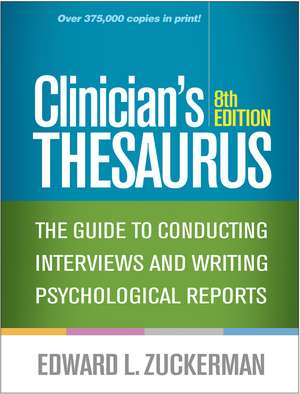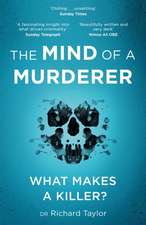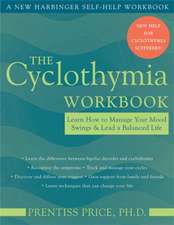Clinician's Thesaurus, Eighth Edition: The Guide to Conducting Interviews and Writing Psychological Reports
Autor Edward L. Zuckermanen Limba Engleză Paperback – 2 mai 2019
*A list of all psychiatric ICD-10 diagnoses (all of the codes in DSM-5, plus many more), including Z codes essential to a comprehensive biopsychosocial evaluation.
*Sample evaluation report keyed to the book's chapters.
*Sections on additional clinical issues: intimate partner violence, gender identity, human trafficking, recovery-oriented language, and more.
*Many more Internet links, including a wide variety of screening and assessment tools. See also The Paper Office for the Digital Age, Fifth Edition, by Edward L. Zuckerman and Keely Kolmes, which provides the essential record-keeping and risk-reduction tools that every psychotherapy practice needs.
Preț: 378.70 lei
Preț vechi: 398.63 lei
-5% Nou
72.47€ • 75.20$ • 60.57£
Carte disponibilă
Livrare economică 24 februarie-10 martie
Livrare express 07-13 februarie pentru 46.44 lei
Specificații
ISBN-10: 1462538800
Pagini: 400
Dimensiuni: 203 x 259 x 22 mm
Greutate: 0.86 kg
Ediția:8 ed
Editura: Guilford Publications
Colecția Guilford Press
Cuprins
A Functional Guide to Report Construction
I. Conducting a Mental Health Evaluation
1. Beginning and Ending the Interview
2. Mental Status Evaluation Questions/Tasks
3. Questions about Signs, Symptoms, and Other Behavior Patterns
II. Standard Terms and Statements for Wording Psychological Reports
A. Introducing the Report
4. Beginning the Report: Preliminary Information
5. Referral Reasons
6. Background Information and History
B. The Person in the Evaluation
7. Behavioral Observations
8. Responses to Aspects of the Examination
9. Presentation of Self
10. Emotional/Affective Symptoms and Disorders
11. Cognition and Mental Status
12. Abnormal Signs, Symptoms, and Syndromes
13. Personality Patterns
C. The Person in the Environment
14. Activities of Daily Living
15. Social/Community Functioning
16. Couple and Family Relationships
17. Vocational/Academic Skills
18. Recreational Functioning
19. Other Specialized Evaluations
D. Completing the Report
20. Summary of Findings and Conclusions
21. Diagnostic Statement/Impression
22. Recommendations
23. Prognostic Statements
24. Closing Statements
III. Useful Resources
25. Treatment Planning and Treatment Plan Formats
26. Formats for Reports, Evaluations, and Summaries
27. Treatments for Specific Disorders and Concerns
28. Listing of Common Psychiatric and Psychoactive Drugs
29. Psychiatric Masquerade of Medical Conditions
Appendices
A. Abbreviations in Common Use
B. Annotated Readings in Assessment, Interviewing, and Report Writing
Feedback Solicitation Form
References
About the Clinician's Electronic Thesaurus, Version 7.0
Notă biografică
Recenzii
"This book not only offers one of the best ways for a new clinician to become immersed in the lexicon of the mental health profession, but is also the definitive resource for writing reports. It is an ideal text for graduate courses focusing on assessment, diagnosis, report writing, forensic reporting, and treatment planning. This is one of the core books that clinicians will want to keep close at hand throughout their careers."--Sean D. Davis, PhD, LMFT, Couple and Family Therapy Program, Alliant International University
"The eighth edition of Zuckerman's Thesaurus is chock-full of resources that every clinician and trainee across mental health fields will find helpful on a daily basis. It is an essential guide for assessment, report writing, and record keeping. This book is so much more than one would expect. It provides a broad range of tips for conducting assessments, helps clinicians to sharpen their writing style, gives advice on complex situations (such as when a client is not being truthful during an evaluation), and highlights words to avoid in assessments and report writing. It includes extremely helpful reference lists and has links throughout to further assessment measures and resources."--Deborah Roth Ledley, PhD, private practice, Plymouth Meeting and Narberth, Pennsylvania
"The Thesaurus is invaluable for teaching students sound diagnostic practices, and is an important tool for professionals who need to communicate critical information to patients and colleagues. The eighth edition's content reflects the latest advances in clinical thinking. Key essential terms are provided that help clinicians conduct effective interviews and describe diagnostic, behavioral, and person-in-environment impressions. I recommend the Thesaurus for use with graduate students in counseling, clinical, or school psychology who have a foundation in diagnosis and assessment and are preparing to work with clients."--Sherri Turner, PhD, Department of Educational Psychology, University of Minnesota Twin Cities
Descriere
Hundreds of thousands of students and early-career professionals have relied on this authoritative report-writing tool, now updated for DSM-5/ICD-10-CM and newer types of evaluations. In a convenient large-size format with lay-flat binding, the book covers nearly all areas of concern addressed in intakes, evaluations, treatment plans, progress notes, and closing summaries. The user seeking the right wording for a clinical document can skim and select from thousands of technical terms, behavioral descriptors, and standard statements. Also provided are interview questions for almost every symptomatic behavior, a huge collection of mental status questions, a reproducible Mental Status Evaluation summary form, and links to hundreds of Internet resources. The companion website offers all the URLs from the book, the reproducible forms, and a handy reference on current psychiatric medications.
New to This Edition
*A list of all psychiatric ICD-10 diagnoses (all of the codes in DSM-5, plus many more), including Z codes essential to a comprehensive biopsychosocial evaluation.
*Sample evaluation report keyed to the book's chapters.
*Sections on additional clinical issues: intimate partner violence, gender identity, human trafficking, recovery-oriented language, and more.
*Many more Internet links, including a wide variety of screening and assessment tools.
See also The Paper Office for the Digital Age, Fifth Edition, by Edward L. Zuckerman and Keely Kolmes, which provides the essential record-keeping and risk-reduction tools that every psychotherapy practice needs.


